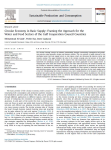Al-Saidi M., Das P., Saadaoui I. (2021). Circular economy in basic supply: framing the approach for the water and food sectors of the Gulf Cooperation Council Countries. Sustainable Production and Consumption, 01/07/2021, vol. 27, p. 1273-1285.
https://doi.org/10.1016/j.spc.2021.03.004
https://doi.org/10.1016/j.spc.2021.03.004
| Titre : | Circular economy in basic supply: framing the approach for the water and food sectors of the Gulf Cooperation Council Countries (2021) |
| Auteurs : | M. Al-Saidi ; P. Das ; I. Saadaoui |
| Type de document : | Article |
| Dans : | Sustainable Production and Consumption (vol. 27, July 2021) |
| Article en page(s) : | p. 1273-1285 |
| Langues : | Anglais |
| Langues du résumé : | Anglais |
| Catégories : |
Catégories principales 03 - POLITIQUE ET THEORIE ECONOMIQUE ; 3.2 - Théorie EconomiqueThésaurus IAMM ECONOMIE CIRCULAIRE ; MODELE ECONOMIQUE ; APPROVISIONNEMENT ; GESTION DES EAUX ; PRODUCTION ALIMENTAIRE ; REUTILISATION DES EAUX USEES ; UTILISATION DES DECHETS ; DECHET ALIMENTAIRE ; CHAINE DE VALEUR ; SYSTEME DE PRODUCTION LOCALISE ; ZONE ARIDE ; CONSEIL DE COOPERATION DU GOLFE ; ETATS DU GOLFE |
| Résumé : | The circular economy concept can enhance sustainability through restructuring consumption and production patterns using innovative designs and business models. This core premise is highly relevant for the interlinked water and food supply sectors in arid regions, which are threatened by natural scarcity and resource overuse. This paper transfers the idea of the circular economy into the practice of the water and food sectors using the example of the region of the Gulf Cooperation Council (GCC). It develops a framework for identifying circular economy strategies and issues applicable to basic supply sectors. In analyzing the value chain and circular strategies of the water and food sectors, the circular economy idea has resulted in numerous industrial applications. The range of applications is illustrated in the key industries of wastewater and local food production. Expanding the reuse options for municipal wastewater and valorizing organic waste represent important circular economy directions for the basic supply sector of the GCC. Incorporating these ideas is positive, but a more comprehensive set of measures is needed to generate low-carbon and low-metabolism economic development in the region. In addition to the current sporadic supply-side initiatives, there is a need for non-technical circular economy strategies related to demand management and waste reduction. |
| Cote : | Réservé lecteur CIHEAM |
| URL / DOI : | https://doi.org/10.1016/j.spc.2021.03.004 |







